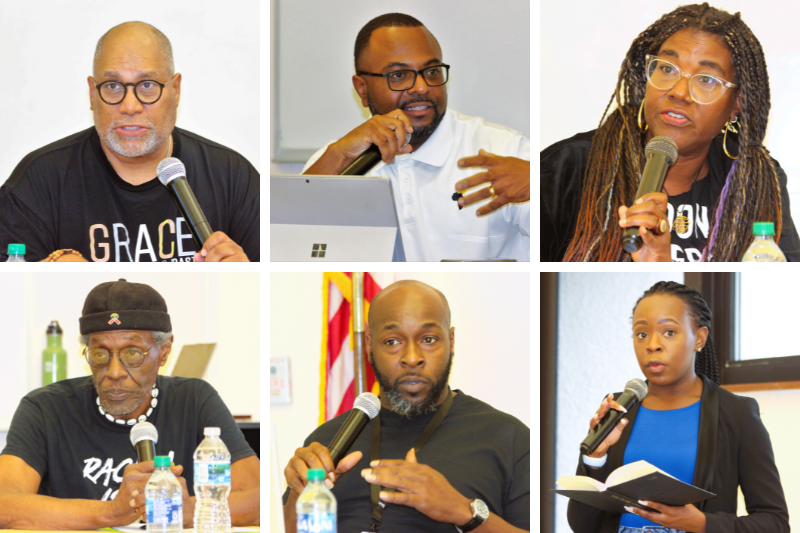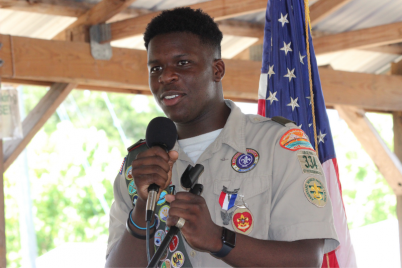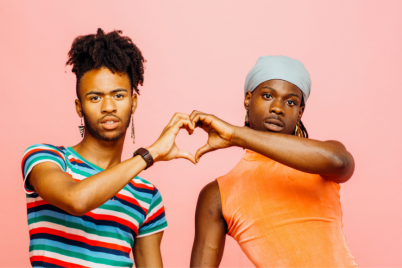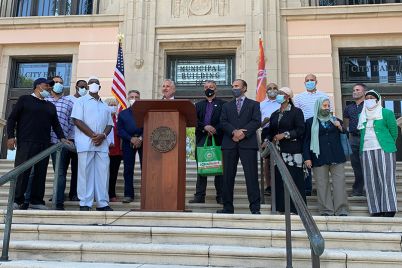The State of Black St. Petersburg panel discussion featured key leaders and elected officials from St. Pete to address issues in the Black community, including Carl Lavender, Jr., District 7 City Councilmember Bro. John Muhammad, Jake-ann Jones, Dr. J. Carl Devine and Royce Wheeler, with Dr. Brittany Peters as moderator.
BY FRANK DROUZAS, Staff Writer
ST. PETERSBURG – Last month, a small crowd gathered at the Enoch Davis Center to discuss the condition of Black residents living in St. Pete. Sponsored by the Pinellas County Urban League Young Professionals, the panel discussion included key leaders and elected officials from St. Pete to address issues in the Black community.
Dr. Brittany Peters, clinical director and owner of Center for Wellness & Clinical Development, LLC, served as moderator and got the ball rolling by asking the panel how can the income gap be closed.
Carl Lavender, Jr., interim CEO of the Foundation for a Healthy St. Pete, noted that a “reparation strategy” design goes back decades in our Black community, he said, and there must be such a strategy to “right size” the economy to make “equivalency more frequent than occasional.”
District 7 Councilmember Bro. John Muhammad said it is crucial to acknowledge the historical roots of many gaps and disparities, such as city-sanctioned redlining. Referencing the Structural Racism Study commissioned by the city, he said it highlighted the “blatant racism that was coming from the elected officials.”
The councilman explained that he has advocated for the city to increase employee wages for full-time and part-time employees, which he said Mayor Ken Welch has made good on.
“Also supporting programs that help to increase educational outputs and skills training,” Muhammad said, “realizing that a lot of the jobs and industries we work in are low-wage jobs and low-wage industries.”
Rather than “demonizing” technology, we should encourage digital entrepreneurship to attract young people entering the workforce, which could create higher wages and close gaps.
“How can we turn these toys into tools?” he said.
Concerning educational disparities, Dr. J. Carl Devine, long-time HIV/AIDS activist and director of the Banyan Tree Project, said that our educational system was designed “not for us but those who had money, for rich white men.”
“One of the things we have to do for ourselves is teach each other,” he said. “I learn, and I hold on to it — that does not help us as a people. But if I learn it and I teach my brother what I have learned, and he teaches his sister what he has learned, then we learn as a group of people to help each other up, not pull each other down. We have been taught to hate ourselves, so we hate each other.”
Jake-ann Jones, a social justice fund advisor with Pinellas Community Foundation, stressed the importance of out-of-school nonprofit programs such as the Barbershop Book Club and Cultured Books Literacy Foundation.
“We need more of those because understand that the educational system in the United States has successfully undereducated Black and Brown children,” she said. “There’s lots of research on that.”
The recent rulings from the state legislature regarding banning certain books and watering down Black history have motivated people to stop waiting for educational equity and turn to activism to effect changes, she said.
Lavender echoed that sentiment, maintaining that the Concerned Organization for Quality Education for Black Students (COQEBS) needs to hold the district more accountable for educational disparities, adding that more groups must do the same work. Muhammad noted that during the pandemic when students were schooled remotely or by their parents, we saw how many parents lacked fundamental skills due to their own deficient educations.
Addressing the goal of ensuring that affordable and safe housing is available to all residents, regardless of race or income level, Muhammad said that as a municipal corporation, it is time for the city to look at getting into the housing business — creating, building, managing and providing housing as a service to the members of the community who need it the most.
“Housing is fundamentally a human right,” he said. “It’s not a privilege provided to those who can afford it. It’s something that should be available to every citizen in the city.”
Jones touted the benefits of a housing cooperative and noted her parents were a part of one in Harlem. In such a co-op, the inhabitants jointly own the residential building.
“That can actually work and really be an equalizer for the community,” she said.
Muhammad said the limited equity housing co-op model is something that the city council has been exploring as a solution to affordable housing.
With all the recent development, Lavender wondered if there is room for affordable housing in the city anymore.
“Is it too late? Has the city’s south side been sold to developers?”
Financial advisor Royce Wheeler added that multi-generation households and roommates are other ways to cope with the rising costs of housing.
He encourages families to hang on to inherited properties and adult children who live with parents to pitch in and form strategies to save money so all can benefit.
The panel also discussed the need to ensure all residents have access to healthy food options, regardless of location or income. Today there are areas, particularly in south St. Pete, known as “food deserts.” Muhammad noted that establishments like discount dollar stores may stock processed food products but very little, if any, “real food.”
“There is a fundamental understanding that the stuff we’re eating is not helping us,” he said, adding that such a diet contributes to declining physical and mental health, depression and even violence.
He said the city might have long-range plans that stretch out for years ahead, but the real urgency is now. Muhammad also noted that the city council has been looking at food and grocery co-op models and lauded the efforts of One Community Grocery Co-Op to bring a community-owned grocery store to south St. Pete. To learn more, he urged everyone to visit ocgc.coop.
Access to mental health resources is crucial for all residents, regardless of socio-economic standing. Lavender pointed out that there is a stigma for Black people in seeking mental health counsel, and they need to overcome that barrier. He said we should hold mental health providers “accountable for the percent of people of color who are on their teams to provide the counseling necessary” to the community. Wheeler and Jones both stressed the importance of adults encouraging young people to talk about any problems they might be experiencing, as that in itself is a beneficial therapy.
Muhammad underscored that good mental health is akin to good physical health and noted that Blacks experiencing racism is itself a form of mental illness.
“Racism and white supremacy as an ideology and practice is a mental illness, and it needs to be looked at as a mental illness,” he said.
Muhammad also stressed community and civic engagement, citing the recently passed zone change, which will allow multi-family units once zoned as single family. He said “a whole bunch of angry white people” came out to the meeting in protest and questioned why Black people do not attend meetings.
“As we talk about StPete2050 Vision Plan, a lot of those plans we don’t find out about until 2049 in August, and the last meeting is in December, and that’s when we all show up and talk about how we don’t like the plan,” Muhammad said.
He encourages Black residents to show up during the planning and public input phases of projects, look at these plans, and “see what you can contribute to and make sure you are included in the plans and planned around.”









Our people must understand that giving out books to children does not guarantee that their reading scores will increase. There is no measurement for determining the success of these book ‘giveaways’. I have friends that give away books and there is no club name attached to it. Our children that are survivors of the African Diaspora need to learn to read and explain what they have read. You give them a book. Who makes sure that they read and discuss the book? We keep doing the same thing and expecting a different result. There needs to be a way of measuring the success of these ‘book giveaways’. PLEASE Stop lauding them when there is no way of determining if they are successful
Giving away books is part of the literacy landscape. We need people who can change the policy of how children are taught how to read in the public school system. We also need our certified teachers to take a course that teaches them how to teach children how to read in their degree programs. Please address policy in higher education and implement more reading instruction programs.